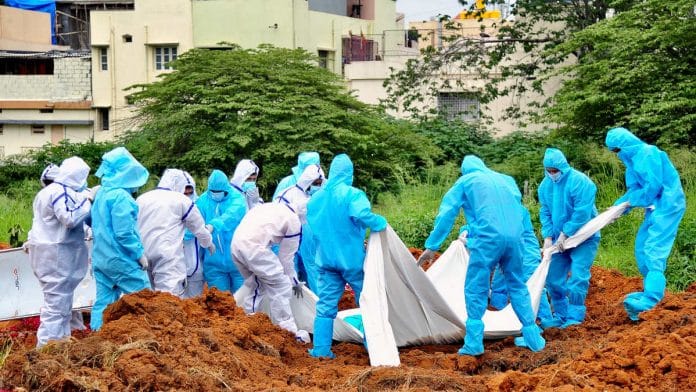New Delhi: The approval for Oxford University-AstraZeneca vaccine in the UK is a big breakthrough in the fight against Covid-19. But another ‘significant’ and ‘curious’ factor has been working in favour of India and other poorer countries.
In episode 651 of ‘Cut The Clutter‘, ThePrint’s Editor-in-Chief Shekhar Gupta looked at data on Covid fatality rates. He also shared findings of a peer-reviewed and yet-to-be released research paper by India’s top scientists on the country’s low fatality.
Comparing countries on the basis of deaths per million revealed that richer countries have a much higher fatality rate. So far, 18 lakh people across the world have succumbed to the virus.
“If you look at that figure, 70 per cent of those deaths have taken place in richer, high-quality-of-life countries. Whereas, nearly 70 per cent of human beings live in countries on the poorer side. So, that tells you that richer countries are seeing more people die,” Gupta pointed out.
In the initial months of the pandemic, people across the world expected poorer countries to be heavily affected by this crisis. For instance, even in the Spanish flu pandemic of 1918, many more people died in the poorer countries. “People had the same vision that there will be streets filled with bodies, drains filled with bodies,” he said.
However, the coronavirus pandemic didn’t lead to as many deaths in the poorer parts of the world. Among international media, there was wonder but also conjecture on whether governments are hiding deaths.
“There were some deaths being missed, as we found out in some our stories… Early on in the pandemic, one day nearly 2,000 deaths were added. That’s when Delhi, Mumbai, Chennai did their fresh audits and rediscovered deaths which had not been attributed to Covid earlier,” he said.
Also read: Wuhan Covid cases could have been 10 times more than the recorded tally, study shows
Fatalities in India’s neighbourhood
In the neighbourhood, the fatality rate in Pakistan is even lesser than India. However, with some critics arguing that Islamabad is fixing the numbers, Gupta said, “So, even if they are fixing it, they can’t be fixing it any more than you say.”
Moreover, Bangladesh, Indonesia and other neighbouring countries have deaths per million in just double digits.
The deaths per million figure is 45 in Pakistan, 46 in Bangladesh, 80 in Indonesia and 107 in India. To put things into perspective, Belgium’s deaths per million number Wednesday was 1667. This rate, Gupta pointed out, is 16 times India’s even as Belgium’s per capita GDP is 16 times higher.
“How can there be a positive correlation between fatalities and a country’s per capita GDP? One would have thought that richer countries had better medical care and better health conditions,” he asked.
The age factor
In this context, it is important to understand the age demographics. Younger the country, the less likely is its population to die of Covid because the virus takes down a larger proportion of people above 60 or 65.
In richer countries, the Covid fatality rates are 10 to 15 times India’s on a per million basis.
These countries are rich and very small. For instance, San Marino, where the rich retirees of the world reside, their deaths per million is highest in the world at over 1700 per million.
“One thing we know for sure, richer countries tend to have older people because richer countries also have higher human development indices. As we have higher human development indices, then your maternal mortality goes down, infant mortality goes down…Their populations don’t grow either,” Gupta said.
Poorer countries have fewer old people and have lower life expectancy than rich countries.
Also read: China approves first Covid vaccine, developed by Sinopharm, for general use
Study on India’s fatalities
Gupta highlighted a paper, to be published next month in a journal called Current Science, which unpacks the reasons behind India’s low fatality. The paper has taken data from all countries on fatalities, GDP and other human development indicators from UNICEF.
In its findings, it is clear that richer the country, higher the number of deaths. “Positive correlations means higher the income levels, higher the number of deaths. Negative means lower the income levels, lower the number of deaths,” Gupta explained.
The study finds that in countries with a history with communicable diseases, such as typhoid, tuberculosis, there is a negative relationship between the history of communicable diseases and fatalities from coronavirus. This is because the history of communicable diseases also comes with a history of poorer hygiene.
“These researchers explain that what kills you is not the virus, what kills you is the hyper immune reaction of our bodies to the virus. The less familiar our body’s immune systems are with invaders, the more likely they are to get alarmed or panicked into a hyper reaction,” he said.
The study doesn’t say there is a direct relationship between the BCG vaccination and Covid facilities. However, there is a direct correlation between BCG vaccine and history of autoimmune diseases. Populations that have received BCG vaccines, their immune systems are trained to deal with the infections better.
Watch the full episode here:
Also read: India’s ‘own Covid variant could emerge sooner or later’, should watch out, top expert says






